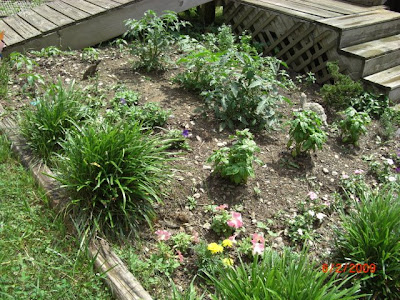Things that you can compost are:
- fruit and vegetable scraps
- leaves and grass cuttings
- shredded newspaper/cardboard
- plant material
- coffee grounds
- egg shells
Things you do not want to compost:
- any kind of fats or animal product
- animal feces
- whole eggs
- "table scraps"
I use a coffee can in the house to store all my scraps until I am ready to take them out to the composter. Something with a lid is definitely preferable or you might get fruit flies.

One of the common myths is that composting will smell bad or stink. This is not true. If you do not put animals products, fat, oils, etc. in your compost it will not stink. At the worst, it will have a slightly sour smell but it is not bad.
So the next step is adding your scraps to the outdoor composter. There are several options for this. Probably the best is a barrel or rotisserie composter. I am lucky enough to have one of these. They are great because they are easy to "turn". Turning the compost makes it break down more quickly.

Other options are a compost pile in which the material is turned with a rake or hoe. My first composter was homemade from a plastic trashcan. Here is how to make one:
http://www.ehow.com/how_16876_make-compost-bin.html
It is important to always start a composter with a couple of shovels of soil. The soil contains all the microbes that are going to break down your materials and create the compost. Also, it is important to keep your compost warm and moist. This is the environment in which the microbes thrive and are most active. It will need to be watered as it dries out.
It is also important to note that many times your composter will be occupied by "critters". Usually some sort of larvae will be munching on your scraps. Some people might be grossed out by this but it helps me to look at them as just one stage is a life cycle. Also, they actually speed up the composting process so they can be somewhat beneficial.
Once your compost is done "cooking", scoop it out and enjoy the happiest plants ever!

Happy Composting! :)







No comments:
Post a Comment